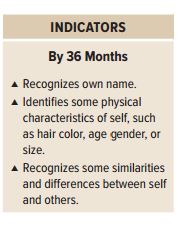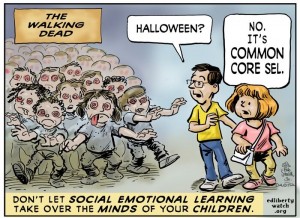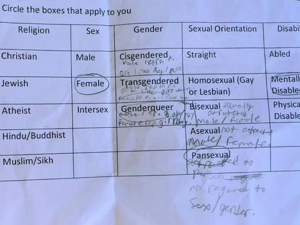New at the Federalist: Schools Ditch Academics For Emotional Manipulation
We are grateful to the Federalist for posting the latest article on social emotional learning from Jane Robbins of the American Principles Project and Dr. Effrem:
It is great that Georgia has joined Tennessee in withdrawing from the CASEL SEL standards movement, but sadly, CASEL is pushing on with a new effort detailed in the article along with a detailed discussion of the dangers of SEL.
**************************************************************************************
This summer the Collaborative for Academic, Social and Emotional Learning (CASEL)announced it had chosen eight states to collaborate on creating K-12 “social emotional learning” (SEL) standards. All students, from kindergartners through high-school seniors, would be measured on five “non-cognitive” factors: self-awareness, self-management, social awareness, relationship skills, and responsible decision-making.
Under such a system teachers become essentially therapists, and students become essentially patients. Supposedly this will clear away the psychological deadwood that obstructs a student’s path to academic achievement.
Federal Government Probes Students’ Psyches
We’ve written about the push by the U.S. Department of Education (USED) and the rest of the progressive education establishment to transform education from academic content instruction to molding and assessing children’s attitudes, mindsets, and behaviors. The infamous “outcome-based education” (OBE) in the 1990s began the trend, and Head Start and the Common Core national standards advance the same foundational principles.
The new federal Every Student Succeeds Act (ESSA) ramps up the trend in several ways. ESSA requires rating schools based partly on “nonacademic” factors, which may include measures of SEL. It also pours money into SEL programs, “which may include engaging or supporting families at school or at home” (i.e., home visits by bureaucrats).
Other provisions include training school personnel on “when and how to refer . . . children with, or at risk of, mental illness,” and implementing programs for children who are deemed “at-risk” of academic or social problems, without ever defining “at-risk.” Similar ESSA language urges school officials to cast a wide net for special education in school-wide “intervention” and “support” programs, allowing schools to sidestep parental consent requirements for formal evaluations.
Beyond ESSA, at least three other federal initiatives aim to monitor children’s attitudes and beliefs. One is the planned revision of the National Assessment of Educational Progress (NAEP), the test referred to as “the nation’s report card,” to assess mindsets and school climate. This revision has been challenged not only on constitutional and privacy grounds, but as a violation of federal law. Of course, law is merely an inconvenience to the Obama administration.
A third federal initiative is USED’s bribery of states to promote SEL standards and data-gathering on preschool children via the Race to the Top Early Learning Challenge grants. These grants, along with the preschool grants in ESSA and Head Start, promote “Baby Common Core”-style SEL standards and data-collection and preserving this in states’ student-data systems. So now every child’s permanent dossier can include how well he played with others when he was four.
Should Government Track Students’ Thoughts, Feelings?
The problems with SEL are both philosophical and operational. Parents rightly object that the school (which means the government) has no business analyzing and trying to change a child’s psychological makeup. It’s one thing to enforce discipline in a classroom and encourage individual students to do their best; good teachers have done that from time immemorial. It’s quite another to assess students on their compliance with highly subjective behavioral standards that may measure personality and individual or family beliefs more than objective shortcomings in performance. The school exists to assist parents in educating their children, not to replace them in that role.
Writing in trade publication Education Week, a SEL consultant touts a new assessment “to generate data about such character strengths as responsibility, resilience, teamwork, curiosity, and leadership.” This violation of both privacy and freedom of conscience is also an alarming effort to standardize children, who normally develop at very different rates and in very different ways, to fit government-determined norms. The government has no right to collect data on any child’s “character strengths,” which are the most personal aspects of a child’s psyche. Period.
The operational problems are also daunting. Who will be assessing a child using these subjective criteria? Psychiatrists, psychologists, and counselors undergo years of training to delve into this murky area. But even these experts admit there are no firm criteria for mental-health diagnoses, especially in children. The World Health Organization, hardly a bastion of conservative medical or political thought, warned: “Childhood and adolescence being developmental phases, it is difficult to draw clear boundaries between phenomena that are part of normal development and others that are abnormal.”
Student self-reporting such as surveys, another common means of compiling SEL data, is similarly unreliable. Prominent SEL proponents Dr. Angela Duckworth and David
Yeager have pointed out that students may interpret survey questions differently from how the creators intended, and that the questions are unlikely to detect incremental changes. As parents of teenaged boys can attest, many children will treat such surveys as a joke and gladly take the opportunity to respond in the most outrageous manner possible.
Because “perfectly unbiased, unfakeable, and error-free [SEL] measures are an ideal, not a reality,” Duckworth and Yeager argue, such measures should not be used to evaluate schools or teachers. Duckworth was so concerned about using these highly subjective criteria in federally mandated accountability schemes that she withdrewfrom a California project to do just that. But this is exactly what USED is pushing through ESSA, and CASEL through its K-12 standards.
Tennessee Family Groups & Legislators Stand Up to Social Emotional Standards Onslaught
Karen R. Effrem, MD – President
Congratulations to the education freedom activists and legislators in Tennessee for standing up to social emotional learning (SEL) national heavyweight, CASEL (Collaborative for Academic, Social, and Emotional Learning). Federally and foundation funded CASEL is trying to impose these subjective, indoctrinating SEL standards via grants in eight states, including Tennessee. The others are California, Georgia, Massachusetts, Minnesota, Nevada, Pennsylvania, and Washington.
CASEL implemented free-standing social emotional standards in Illinois in 2004. We fought them back then as EdWatch. Here is an example of the extremely subjective standards put in place:
“Consider ethical, safety, and societal factors in making decisions.”
The Tennessee Department of Education (TNDOE) said in its presentation that the five competencies that would be taught are: 1) Responsible Decision Making 2) Relationship Skills 3) Social Awareness 4) Self-Awareness 5) Self-Management. These are essentially the same ones mandated in Illinois.
How, does a student, especially a young child, “consider ethical…factors in making decisions” when adults that are supposed to be role models are not doing so? For example, some physicians are shirking their ethical duty to protect the health and emotions of gender-confused children by prescribing dangerous, life-altering hormone treatments at the drop of a hat when a child declares a transgender identity, despite overwhelming research (also HERE) showing more than 80% of these adolescents revert back to an identity corresponding to their biological sex at birth, and the suicide rate among those who complete the transition to the opposite sex is very high.
TNDOE also said that these SEL standards would be integrated into every area of learning, but then claimed there would be no assessment and no student data collection. It is nice to see that they may be listening to the main concerns, even if only in an effort to deflect them, from many organizations and parents across the nation. However, research from Joy Pullman of the Heartland Institute, Jane Robbins and Emmett McGroarty of the American Principles Project, and Shane Vander Hart of Truth in American Education as well as from us here at Education Liberty Watch and our related organization, The Florida Stop Common Core Coalition, make that highly unlikely if not impossible to believe. SEL with affective data mining is the Holy Grail for Common Core, for corporations seeking a compliant workforce, and for government busy-bodies. Here is an example of another prominent group besides CASEL pushing SEL via Common Core:
ASCA [American School Counselors Association] – “Mindsets & Behaviors align with specific standards from the Common Core State Standards through connections at the competency level.”
As all of these documents show, social emotional standards are highly subjective and dangerous to freedom of thought and conscience, as well as privacy. They also perpetuate the false notion that it is the government schools’ responsibility to inculcate these values in place of parents and religious institutions; allow for indoctrination on controversial non-academic issues; and place more emphasis on job skills than on academics.
Many thanks to the Family Action Council of Tennessee (FACTN), Tennessee Eagle Forum (TNEF) and Tennessee Against Common Core for standing up to protect the families of Tennessee in this matter. All three groups alerted their members and warned legislators. Here is part of a podcast from FACTN:
This initiative is a potential Trojan Horse for social engineering in our schools. If we do not take action and contact our legislators, our children may be taught values at school that conflict with values being taught at home.
TNEF alerted its members with this information from the EdWeek article about the multistate effort and its many problems (problems admitted even by this very pro-government and Gates Foundation-funded education publication):
What about that tricky issue of measuring social-emotional learning? The controversial approach has been heavily discussed lately because the Every Student Succeeds Act, or ESSA, requires states to add an “additional indicator” to their school accountability systems in addition to traditional factors, like student test scores…But many prominent researchers have questioned the validity of self-reported student surveys, which are most commonly used to measure SEL. And some have said it’s problematic to use those surveys for high-stakes accountability purposes.
Tennessee Against Common Core also sent out an important and helpful alert.
The legislators involved also showed keen discernment about this problematic endeavor. It was clear from the legislative hearing (beginning at 1:42:12) that the elected officials were very concerned about these on a number of levels, the most obvious from the hearing being national/federal interference in the education system of a sovereign state. Parents’ rights, cost, overcrowding of an already packed school schedule, and burden on teachers were other important concerns raised.
All of these combined to show TNDOE that there was little appetite in that state for this effort. Here is the letter from the executive director of Tennessee’s Office of Safe and Supportive Schools, Pat Connor, as documented by TNEF containing the bureaucratically disguised cry of “Uncle!” (emphasis added):
The previously scheduled meeting for Thursday has been postponed. We will reach out soon with a new date for our first meeting.
The work around social and personal competencies is vital to Tennessee students’ readiness for the workforce. Thus, it is critical to align this work with other state goals around workforce readiness. Due to the time required to ensure this alignment, we cannot meet the timeline set forth by CASEL. As a result, we will not be able to be a part of the Collaborative States Initiative. However, based on the feedback we continue to hear about the need to support teachers in meeting the non-academic needs of all students, we will continue to independently develop Tennessee social and personal competencies. These competencies will be optional and will not be assessed.
We are excited about this continuing work and will have internal dates and agendas forthcoming. In addition, opportunities for external stakeholder engagement will be announced soon.
Best,
Pat Conner | Executive Director – Office of Safe & Supportive Schools
This is a very encouraging development and Tennessee activists and legislators deserve much credit and congratulations. This success will be helpful and inspiring to the other states targeted by CASEL. As mentioned in its email, however, the TNDOE still plans to pursue psychological indoctrination and profiling of the state’s children in service of “workforce readiness.” As was also pointed out by Bobbie Patray, president of TNEF in her newsletter, constant vigilance as well as strong parental action is still needed because of the SEL teaching materials already developed, such as the TNDOE document titled “Incorporating Social and Emotional Learning Into Classroom Instruction and Educator Effectiveness: A Toolkit for Tennessee Teachers and Administrators.”
Let us celebrate this victory in a battle, but continue the fight of the long war. Stay tuned for more updates. As Thomas Jefferson, author of the Declaration of Independence, so wisely said, “Eternal vigilance is the price of liberty.” Thank you for all you do to protect the hearts and minds of our children! And to CASEL, we say, “Game on!”
Federally Funded National Group Pushes More Social Emotional Standards
Jane Robbins, attorney and senior fellow for the American Principles Project and Shane Vander Hart at Truth in American Education, have both written excellent columns about the dangers of the next big edu fad – social emotional learning standards. Eight states are working with CASEL to adopt them. These are California, Georgia, Massachusetts, Minnesota, Nevada, Pennsylvania, Tennessee, and Washington.
We have long written about the dangerous loss of freedom of conscience and privacy inherent in social emotional research and data gathering via the allegedly academic Common Core aligned tests that are being amplified in the Every Student Succeeds Act’s accountability paradigm. Mrs. Robbins was kind enough to cite Dr. Effrem’s research paper on this topic. Here is an excerpt:
When non-psychologists dabble in these murky waters, the result is tremendously subjective analyses of what a child is thinking or feeling as opposed to what the government thinks he should be thinking or feeling. Dr. Karen Effrem, who has researched and written extensively about the issue of SEL, warns about the subjectivity of this kind of analysis, particularly with young children.
Even prominent SEL proponents caution that assessing students on SEL standards, especially with the common mechanism of student surveys, can be a shot in the dark. Researchers Angela Duckworth and David Yeager have said that “perfectly unbiased, unfakeable, and error-free measures are an ideal, not a reality.” [Read the whole column titled: The Latest Big Education Fad, Social-Emotional Learning, Is As Bad As It Sounds]
CASEL or the Collaborative for Academic, Social and Emotional Learning receives major taxpayer funded grants. Their website says they received funding from the Institute for Education Sciencesthat is also pushing the social emotional research and profiling on students via the Strengthening Education Through Research Act (SETRA):
Goal number one of Goals 2000 says, “All children will start school ready to learn.” As we have documented, this mandate, disguised as a goal, has given rise to the metastatic growth of early childhood programs across the country. In these programs, “ready to learn” has little or nothing to do with preparing young children to learn academic subjects and much to do with indoctrination of our very youngest and most vulnerable children in the most radical of ideologies. Even if accepted by some parents, it is completely wrong to teach ideology to three, four and five year old children. The ideas being promoted include: earth worshiping environmentalism, radical feminism, engendering fear and hatred of our military, and acceptance of homosexuality. It is these principles that are taught to young children and considered part of “social and emotional” development.
Social and emotional development is a large part of another mandate within Goals 2000. Goal eight says, “Every school will promote partnerships that will increase parental involvement and participation in promoting the social, emotional, and academic growth of children.” Notice that academic growth is the lowest priority on that list. That relegation of academics to such a low priority has resulted in an emphasis on work based and service learning out of the classroom, group projects, whole language, fuzzy math, and civics that undermine the principles of freedom within the Declaration of Independence.
It is critical that we as parents fight to protect the hearts and minds of our precious children from this growing threat to their privacy and freedom of thought. We must reject this overt indoctrination of our children and demand an end to psychological data mining inherent in Common Core based teaching, tests, data mining, and competency based education.
Acute Need for Psychological Data Protection Demonstrated by Sexual Orientation Survey
A Florida public school teacher was suspended and then resigned after giving the following “White Privilege” survey in Spanish class that asked questions about sexual orientation, gender identity, religion, and disability status:

Issues
- Assessments + Testing (25)
- Bullying/Sex Education (6)
- Child Protection League (2)
- Common Core Standards (78)
- Curriculum + Standards (65)
- Data Collection and Data Privacy (64)
- Early Education/Nanny State (75)
- Federal Education (128)
- International Education (6)
- LGBT Issues in Education (9)
- Media Appearances (4)
- PL/CBE (2)
- Planned Economy (11)
- Politics of Education (26)
- School Violence (9)
- Social Emotional Learning/Mental Health (52)
- State Education (89)
- Testimony/Presentations (17)
- Uncategorized (13)
- Unions (10)
Education Liberty Watch Projects
ELW Allies
- American Principles Project
- Cato Institute
- Conservative Teachers of America
- Constitutional Coalition
- Eagle Forum
- Minnesota Advocates and Champions for Children
- Missouri Education Watchdog
- Restore Oklahoma Parent Empowerment
- Stop Common Core
- The Pioneer Institute
- Truth in American Education
- What is Common Core – Education Without Representation


